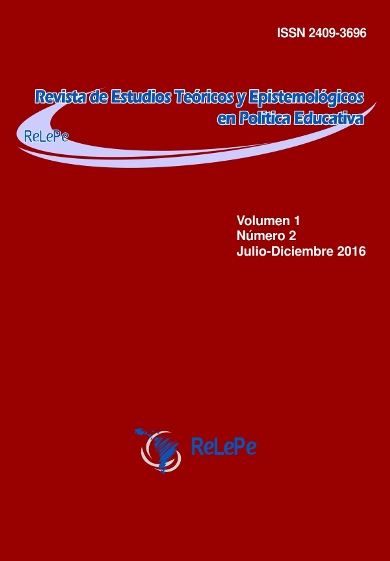Theoretical and methodological challenges for teaching education policies in the historical materialist perspective
Abstract
Abstract: This paper contains some reflections that resulted from a long experience in curriculum components related to educational policies in undergraduate and graduate programs in Argentina and Brazil. These reflections are a first systematization, without any claim to completeness, of the main problems identified in the end-of-course works prepared by students from three curriculum components, distinguishing general problems, resulting from deficiencies of these students’ previous education, from specific issues related to difficulties in understanding the conceptual basis of the historical materialism and the theoretical-methodological conception that guides the organization of these courses. After a brief presentation of these bases, this text highlights and discusses four very common problematic conceptions in these final works: a history with no subject, which renews the myth of progress; a world that is driven almost exclusively by ideas, transformed into pure political will; a State that assuming the central role in the social scene is understood as a subject; an education as an isolated sphere of reality. Finally, the brief closing remarks point out paths to deepen the proposed reflection.
Keywords: Education policies. Theoretical and methodological conceptions. Historical materialism. State. Education.
Metrics
References
Castillo, J. E. (2007). “La genealogia del Estado en Marx”. In: Thwaites Rey, M. (Comp.). Estado y marxismo. Un siglo y medio de debates, Buenos Aires, Prometeo Libros.
Coutinho, C. N. (2008). “A dualidade de poderes: Estado e revolução no pensamento marxista”. In: Coutinho, C. N. Marxismo e política: a dualidade de poderes e outros ensaios, São Paulo, Cortez.
Eagleton, T. (2012). Marx estava certo, Rio de Janeiro, Nova Fronteira.
Fontes, V. (2006). “Sociedade civil no Brasil Contemporâneo: lutas sociais e luta teórica na década de 1980”. In: Lima, J. C. F. e Neves, L. M. W. (Orgs.) Fundamentos da educação escolar do Brasil contemporâneo. Rio de Janeiro, Ed. Fiocruz/EPSJV.
Gramsci, A. (2001). Cadernos do cárcere. Os intelectuais. O princípio educativo. Jornalismo. Volume 2, Rio de Janeiro, Civilização Brasileira.
Harvey, D. (2008). O neoliberalismo: história e implicações. São Paulo: Loyola.
Lowy, M. (2005). Walter Benjamin: aviso de incêndio. Uma leitura das teses “Sobre o conceito de história”. São Paulo, Boitempo Editorial.
Marx, K e Engels, F. (2007). A ideologia alemã. São Paulo. Boitempo Editorial.
Neves, L. M. W. (Org.) (2005). A nova pedagogia da hegemonia. Estratégias do capital para educar o consenso. São Paulo, Xamã.
Neves, L. M. W.; Pronko, M. (2008). O Mercado do conhecimento e o conhecimento para o Mercado: da formação para o trabalho complexo no Brasil contemporâneo. Rio de Janeiro, EPSJV.
Neves, L. M. W.; Pronko, M. (2010). “A atualidade das ideias de Nicos Poulantzas no entendimento das Políticas Sociais no Século XXI”. Germinal: Marxismo e Educação em Debate, v.1, n.2, pp. 97-111.
Poulantzas, N. (2000). O Estado, o poder, o socialismo. Rio de Janeiro: Graal.
Pronko, M. (2014). “O Banco Mundial no campo internacional da educação”. In: Pereira, J. M. M.; Pronko, M. A demolição de direitos – um exame das políticas do Banco Mundial para a educação e para a saúde (1980-2013). Rio de Janeiro, EPSJV.
Downloads
Published
How to Cite
Issue
Section
License
1. Autores mantém os direitos autorais e concedem à revista o direito de primeira publicação, com o trabalho simultaneamente licenciado sob a Licença Creative Commons Atribuição 4.0 Internacional que permite o compartilhamentodo trabalho com reconhecimento da autoria e publicação inicial nesta revista.2. Autores têm autorização para assumir contratos adicionais separadamente, para distribuição não-exclusiva da versão do trabalho publicada nesta revista (ex.: publicar em repositório institucional ou como capítulo de livro), com reconhecimento de autoria e publicação inicial nesta revista.
3. Autores têm permissão e são estimulados a publicar e distribuir seu trabalho online (ex.: em repositórios institucionais ou na sua página pessoal) a qualquer ponto antes ou durante o processo editorial, já que isso pode gerar alterações produtivas, bem como aumentar o impacto e a citação do trabalho publicado (Veja O Efeito do Acesso Livre).
__________
Los autores que publican en esta revista están de acuerdo con los siguientes términos:
1. Los autores conservan los derechos de autor y garantizan a la revista el derecho de ser la primera publicación del trabajo al igual que licenciado bajo una licencia de Creative Commons Reconocimiento 4.0 Internacional que permite a otros compartir el trabajo con un reconocimiento de la autoría del trabajo y la publicación inicial en esta revista.
2. Los autores pueden establecer por separado acuerdos adicionales para la distribución no exclusiva de la versión de la obra publicada en la revista (por ejemplo, situarlo en un repositorio institucional o publicarlo en un libro), con un reconocimiento de su publicación inicial en esta revista.
3. Se permite y se anima a los autores a difundir sus trabajos electrónicamente (por ejemplo, en repositorios institucionales o en su propio sitio web) antes y durante el proceso de envío, ya que puede dar lugar a intercambios productivos, así como a una citación más temprana y mayor de los trabajos publicados (Véase The Effect of Open Access) (en inglés).
__________
If the article is accepted for publication, copyright of this article will be vested in the The Journal of Theoretical and Epistemological Studies on Education Policy.

Este obra está licenciado com uma Licença Creative Commons Atribuição 4.0 Internacional.

This work is licensed under a Creative Commons Attribution 4.0 International License.

Este obra está bajo una licencia de Creative Commons Reconocimiento 4.0 Internacional.





